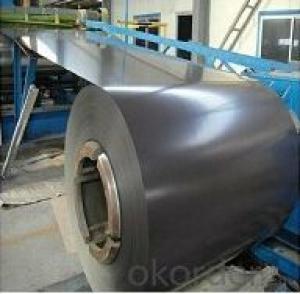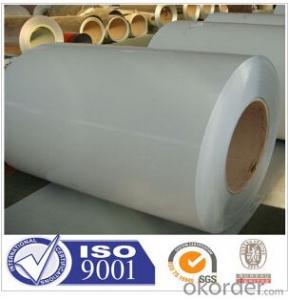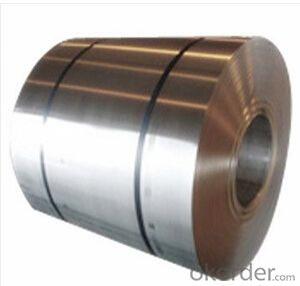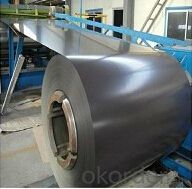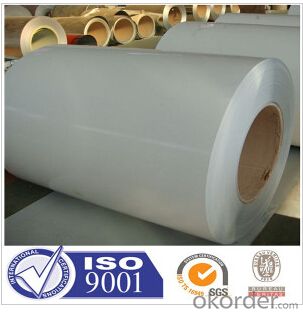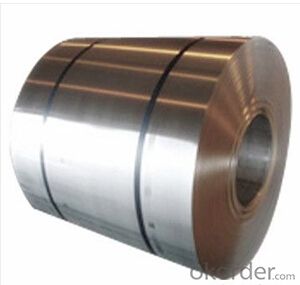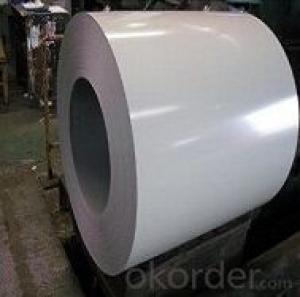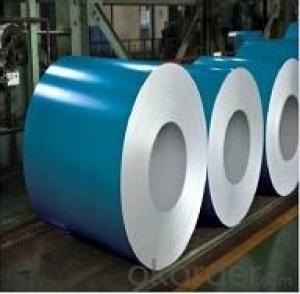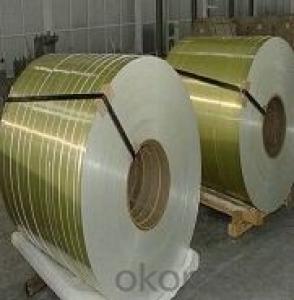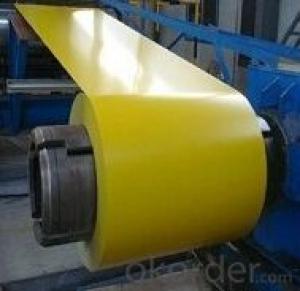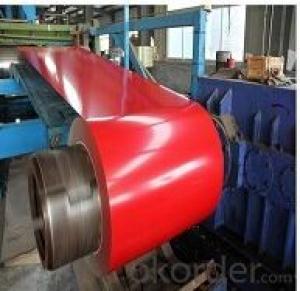0.12mm-1.3mm Prepainted Galvanized Steel Coils
- Loading Port:
- Shanghai
- Payment Terms:
- TT OR LC
- Min Order Qty:
- 25 m.t.
- Supply Capability:
- 10000 m.t./month
OKorder Service Pledge
OKorder Financial Service
You Might Also Like
Basic Info.
Model NO.:MLK-2015157
Surface Treatment:Coated
Certification:ISO, SGS, BV, RoHS, IBR
Technique:Cold Rolled
Standard:ASTM, JIS, GB, AISI, DIN, BS
Application:Construction Material
Edge:Mill
Stock:Stock
Steel Grade:Dx51d, SGCC, Sgch, A653, Dx52D, Dx53D
Place of Origin: China
Width:600mm-1500mm
Thickness:0.13mm-0.8mm
Length:Customered
Delivery Time:15-30 Days
Zinc Coating:30-275G/M2
Top Color Coating:10-25
Bottom Color Coating:7-10
ID:508mm
Export Markets:South America, Eastern Europe, Southeast Asia, Africa, Oceania, Mid East, Eastern Asia
Additional Info.
Trademark:MALIKE OR OEM
Packing:Standard Seaworthy, Export Packing
Standard:AISI, ASTM, BS, DIN, GB, JIS
Origin:Shandong, China
HS Code:7210700000
Production Capacity:700mt/Day
| NAME | GALVANIZED | GALVALUME/ALUZINC | PPGI/PPGL |
| MODEL NO. | (0.13-1.2)mm*(600-1250)mm | ||
| TYPE | steel coil, steel sheets/ plates, corrugated steel sheets/plates | ||
| TECHNIQUE | Hot rolled-cold rolled-galvanized | hot rolled-coldrolled-galvalume /Aluzinc | Hot rolled-cold rolled--galvalume/galvanized - PPGL/PPGI |
| SURFACE TREATMENT | Mini/regular/ big/zero spangle, ,Chromate treatment/ chromate-free treatment/ untreated Unoile/ oiled ,TENSION LEVELLERT SKIN PASS anti-fingerprint/Un-anti-fingerprint, coating | Polyester(PE),Silicone Modified(SMP),Acrylic (AC), Polyurethane(PU)PVC Plastisol(PVC plastisol can be embossed to versatile texture)etc | |
| APPLICATION | Guardrails, ventilation ducts, gutters and down spouts, Pre-paint and post paint applications, gutters and down spouts, ceiling suspension bars, shutter door rails. Auto parts, electrical appliances, refrigerator appliances, signs, automotive parts,vending machines, washing machines, showcases and other structural use, roofing, commercial use | Gutters, auto parts, electrical appliances, vending machines, refrigerators, ovens, for pre-paint. structural use, roofing, commercial use etc | Electrical appliances, roofing, partitions. Factory buildings, elevator panelsetc Special applications: wear resistant steel, high-strength-steel plate |
- Q: Hello,I have been thinking about buying a Tungsten Carbide Diamond wedding band for my husband but one of my family members keep telling me that Tungsten Carbide is merely steel and hence, a low quality metal, therefore, I shouldn't buy it. I don't really know much about it. Please if anyone can tell me more about this metal? Thanks.
- Edmond, a laser doesn't scratch anything, it melts. We're talking physical properties, not plasma properties. At NORMAL temperatures of 70-90 degrees F. If you don't understand the question, quit answering. Id imagine tungsten carbide can scratch itself. Much like an ape. :) - The Gremlin Guy -
- Q: What are the common coil transportation methods?
- The common coil transportation methods include using flatbed trucks, coil racks, coil cars, and coil trailers.
- Q: What temp does fire have to be to melt steel?
- You need about 2800 degrees to melt steel.
- Q: Guitar?I have a steel- string, but prefer nylon.:)
- Steel string. More resonance, better sound quality and control.
- Q: How are steel coils used in the production of oil and gas pipelines?
- Steel coils are used in the production of oil and gas pipelines as they provide the necessary strength and durability required for transporting petroleum products over long distances. These coils are formed into pipes through various manufacturing processes, such as hot rolling or cold forming, and then welded together to create a continuous pipeline. The high tensile strength of steel coils ensures that the pipelines can withstand the high pressure and harsh environmental conditions associated with oil and gas transportation.
- Q: Im going to buy T-304 Stainless Steel exhaust tips for my truck. Is T-304 Stainless Steel good metal?
- Surprisingly any stainless steel is considered soft or tough metal. A hardness tester will bare this out. It resists work hardening which means you can bend it many more times than cold rolled or hot rolled steel before it will break. Your choice is a good one for your intended purpose.
- Q: What are the advantages of using steel coils?
- There are several advantages of using steel coils. Firstly, steel coils offer superior strength and durability, making them suitable for various applications in industries such as construction, automotive, and manufacturing. Secondly, steel coils have excellent resistance to corrosion, ensuring longevity and reducing maintenance costs. Additionally, steel coils can be easily shaped or formed into different sizes and shapes, providing flexibility in design and manufacturing processes. Lastly, steel coils are recyclable, making them an environmentally friendly choice and contributing to sustainable practices.
- Q: How are steel coils inspected for elongation?
- Steel coils are inspected for elongation using a variety of methods. One common method is the use of a tensile testing machine. In this method, a small sample is taken from the steel coil and placed into the machine. The machine then applies a pulling force to the sample until it breaks. The amount of force required to break the sample is measured, and this information is used to determine the elongation of the steel coil. Another method used to inspect steel coils for elongation is the use of ultrasonic testing. In this method, high-frequency sound waves are passed through the steel coil. By analyzing the reflection of these sound waves, it is possible to determine the elongation and other properties of the steel coil. Visual inspection is also an important aspect of inspecting steel coils for elongation. Trained technicians visually inspect the steel coils for any signs of stretching or deformation that may indicate excessive elongation. Overall, a combination of mechanical testing, ultrasonic testing, and visual inspection is used to thoroughly inspect steel coils for elongation and ensure their quality and compliance with industry standards.
- Q: How are steel coils inspected for width variations?
- Steel coils are inspected for width variations by using a non-contact laser measurement system. This system measures the width of the coil at various points along its length, ensuring that it meets the required specifications.
- Q: How are steel coils used in the production of structural steel?
- Steel coils are widely used in the production of structural steel due to their versatility and efficiency. These coils, which are made by rolling steel into a cylindrical shape, serve as the raw material for various structural steel products. One of the primary uses of steel coils in the production of structural steel is in the manufacturing of beams and columns. These coils are processed in steel mills, where they undergo cutting, shaping, and bending to form the desired profiles. Beams and columns are essential components of any building or infrastructure project as they provide support and stability. Steel coils are also used in the fabrication of steel plates, which are widely used in the construction industry. These plates are used for flooring, cladding, and roofing purposes, adding strength and durability to structures. By using steel coils as the starting material, manufacturers can produce steel plates of various thicknesses and sizes according to project requirements. Furthermore, steel coils are an integral part of the production process for pipes and tubes. These coils are formed into a cylindrical shape and then welded or seamless to create pipes and tubes of different diameters. Steel pipes and tubes are vital for various applications, including water and gas transportation, structural frameworks, and industrial systems. In addition to these applications, steel coils are also used in the production of other structural steel products such as angles, channels, and hollow sections. These products are widely used in construction projects, providing structural support, reinforcement, and aesthetic appeal. Overall, steel coils play a crucial role in the production of structural steel by serving as the raw material for various products. Their versatility, ease of processing, and strength make them an ideal choice for manufacturers, ensuring the production of high-quality and reliable structural steel components.
Send your message to us
0.12mm-1.3mm Prepainted Galvanized Steel Coils
- Loading Port:
- Shanghai
- Payment Terms:
- TT OR LC
- Min Order Qty:
- 25 m.t.
- Supply Capability:
- 10000 m.t./month
OKorder Service Pledge
OKorder Financial Service
Similar products
Hot products
Hot Searches
Related keywords
